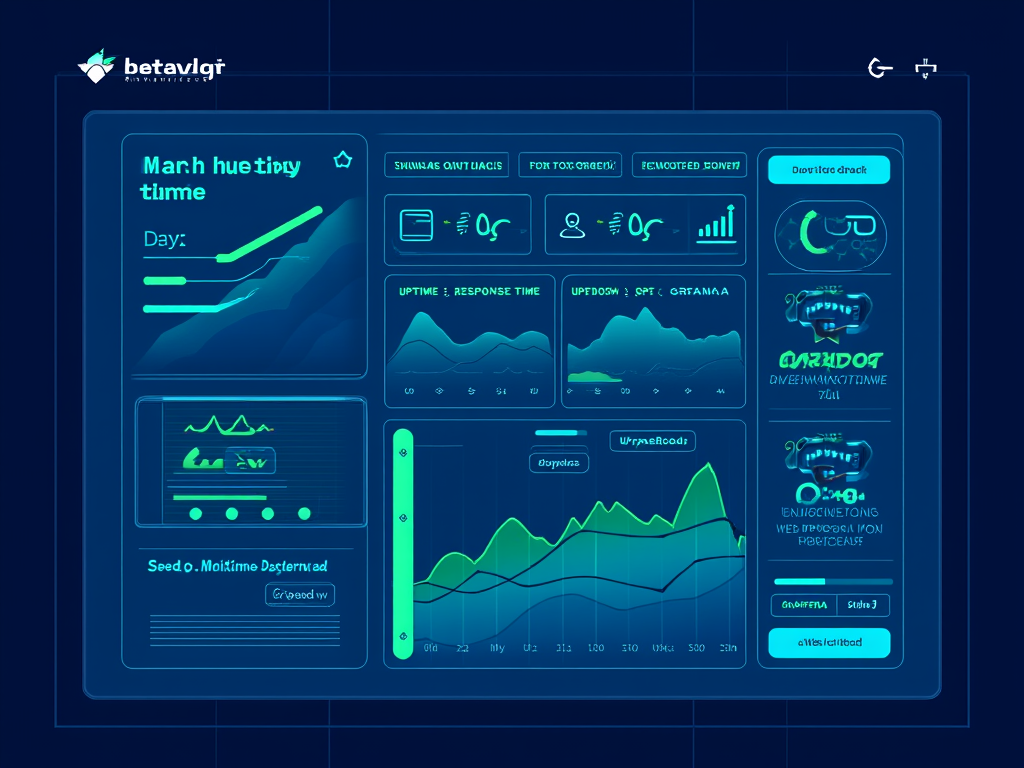What is a service level agreement (SLA) in hosting?
Understanding the SLA Landscape
ა Service Level Agreement (SLA) is more than just a piece of paper; it’s a lifeline in the digital world where every second counts. Imagine your website is a bustling street market. Everything hinges on the vendors showing up and the goods arriving on time. If there's a disruption, it impacts not just the vendors but the entire community of shoppers. This is where SLAs come into play—they set the rules of engagement, ensuring that everyone knows what to expect.
In the realm of web hosting, an SLA is a formalized contract that defines the level of service a customer can expect from their hosting provider. It encompasses uptime guarantees, support availability, performance metrics, and even penalties if things go awry. Without these agreements, chaos can ensue, leading to frustrations and lost revenue. A solid SLA acts like a safety net, establishing trust and clarity between the provider and the customer.
Key Components of a Hosting SLA
Diving deeper into SLAs, let's explore the main components that shape this vital document:
1. Service Overview
This section lays the groundwork, clearly defining the scope of services offered and outlining the responsibilities of both parties. It’s a roadmap that clarifies what’s ensured and what’s at stake.
2. Performance Guarantee
At the heart of any SLA is the uptime guarantee, often touted as 99.9% uptime, which translates to a mere 43 minutes of downtime per month. But don't let those numbers mislead you; each second offline can feel like an eternity. This guarantee reassures customers that they won’t be left in the lurch when unexpected issues arise.
3. Support Framework
Here’s where the rubber meets the road. The SLA details how support is available—be it through phone, chat, or email—and outlines response times for various levels of urgency. For example, if your site goes down, knowing whether a support team will respond in 15 minutes or two hours can make a world of difference.
4. Security Commitments
In a world where data breaches and privacy concerns are rampant, an SLA must include specific security measures. This can range from how customer data is backed up to what protocols are in place to prevent unauthorized access. Think of this as your insurance policy for data safety.
5. Compensation Structure
SLAs must also define what happens when promises are broken. What are the ramifications if downtime exceeds the agreed amount? Most hosting providers will offer compensation, typically in the form of service credits, giving customers a tangible remedy when things don’t go as planned.
6. Exclusions and Maintenance
Of course, no agreement is complete without addressing exclusions. This section outlines liabilities and sets boundaries regarding scheduled maintenance, acts of God, or customer-inflicted issues.
Practical Tips on Hosting SLAs
Now that we’ve dissected the components, let’s boil it down to actionable insights:
1. Why SLAs Matter
SLAs illuminate the path to service clarity, like streetlights guiding you through the night. They ensure that both parties have a mutual understanding of expectations and hold the provider accountable.
2. Negotiability of SLAs
Not all businesses operate the same way. If you have unique demands, don’t be afraid to negotiate terms that align with your objectives. After all, why settle for a cookie-cutter solution when your needs are bespoke?
3. Common SLA Metrics
Metrics matter. Uptime percentages, response times, backup frequencies—they all paint a picture of reliability. Focusing on these can lead to a better understanding of which hosting services truly deliver on their promises.
4. Security and Compliance Standards
If your website deals with sensitive data, look for SLAs that mention compliance with regulations like GDPR or HIPAA. Your customers trust you; don’t let them down by skimping on security.
5. Customer Responsibilities
An SLA is a two-way street. Besides what the provider is responsible for, your obligations are just as crucial. Ensure you’re aware of these to avoid any potential pitfalls.
6. Examples in Practice
To solidify your understanding, consider real-world examples. For instance, companies like Amazon-ის ვებ სერვისები, ბლუჰოსტიდა GoDaddy showcase SLAs that not only highlight their commitment to uptime but also reflect their strategy to build customer-centric relationships.
Understanding SLAs might seem like diving into murky waters, but once you shine a light on their importance—not only for your business but for those who depend on your online presence—everything becomes clearer. They are not simply contracts; they are promises shaped by performance, trust, and mutual accountability.
FINDDOMAIN.GE (შპს ინტერნეტ სერვისები) ძალიან საინტერესო და სწრაფად განვითარებადი IT კომპანიაა. ძირითადი მიმართულებებია: ვებ-განვითარება, დომენები და ვებ-ჰოსტინგი. ის ასევე სთავაზობს კლიენტებს ძირითად სერვისებთან დაკავშირებულ ქვე-მომსახურებას და აუთსორსინგს.
საუკეთესო შეთავაზებები:
გსურთ შექმნათ თქვენი საკუთარი კომპანიის ვებსაიტი ან შექმნათ თქვენი საკუთარი ონლაინ ბიზნესი ინტერნეტში?
– ვებ ჰოსტინგი
– დომენის რეგისტრაცია
– ვებ-განვითარება
– საიტის შემქმნელი



Final Considerations on Hosting SLAs
Understanding the nuances of Service Level Agreements (SLAs) is vital for making informed decisions about your hosting service. As the demands on digital infrastructure continue to grow, an SLA serves as a crucial compass, guiding both hosting providers and businesses through the tumultuous waters of service expectations.
The Importance of Monitoring
Once you have selected a hosting provider and signed an SLA, the journey doesn’t end there. Regular monitoring of the agreement's terms is just as critical as negotiating them. Keeping an eye on uptime statistics, support response times, and other key metrics enables you to hold your provider accountable.
Consider employing automated monitoring tools that can alert you to issues such as server downtimes or slow response times. These tools can provide data to back up your claims when discussing SLA violations with your hosting provider, ensuring that your voice is heard and concerns are addressed swiftly.
1. Leverage Technology
Web applications, like პინგდომი და უწყვეტი მუშაობის რობოტი, can track your site’s performance in real-time, allowing you to gather valuable insights related to SLA commitments.
Negotiating Each Renewal
When it’s time to renew your hosting services, make it a point to revisit the SLA. This is your chance to negotiate terms that reflect your changing business needs. For instance, if your traffic has significantly increased or if you've launched a new product that demands higher uptime guarantees, bring these up in your discussions. Don’t be shy; negotiating terms can lead to more favorable conditions, ensuring that your agreement evolves along with your business growth.
2. Stay Informed
The hosting landscape is continually evolving, and remaining informed about industry standards and trends will empower you in these discussions. Knowledge is power—understanding what other competing hosting services offer can arm you with the information necessary to demand better terms.
Communicate Openly with Your Provider
Good communication can transform a business relationship. Keep an open dialogue with your hosting provider regarding any concerns or service changes. Your provider should be viewed as a partner in your success; thus, fostering a strong relationship can lead to improved support during crucial times.
3. Share Feedback
Don’t hesitate to share your experiences, both good and bad. Effective feedback can lead to improvements in the services offered by providers, resulting in better experiences not just for you but for others in the hosting community.
დასკვნა
Navigating the complexities of SLAs can seem daunting at first, but arming yourself with knowledge and practicality makes the process manageable. A well-structured Service Level Agreement is not just a document; it is the cornerstone of your hosting experience that helps secure not only your website's reliability but also the trust of your users.
By understanding the components, monitoring performance, negotiating thoughtfully, and communicating openly, you can ensure that your hosting experience is as seamless as possible. So, as you venture into the world of hosting, remember these principles and let them guide you to a service level that truly meets your expectations.
To further enrich your understanding, check out these valuable videos:
By keeping these lessons in mind, you can navigate the challenges of hosting with confidence, ensuring that your digital presence remains robust and reliable.
ცნობები
- Understanding SLAs
- Importance of Hosting Uptime
- Customer Responsibilities in SLAs
- Service Compensation Insights
FINDDOMAIN.GE (შპს ინტერნეტ სერვისები) ძალიან საინტერესო და სწრაფად განვითარებადი IT კომპანიაა. ძირითადი მიმართულებებია: ვებ-განვითარება, დომენები და ვებ-ჰოსტინგი. ის ასევე სთავაზობს კლიენტებს ძირითად სერვისებთან დაკავშირებულ ქვე-მომსახურებას და აუთსორსინგს.
საუკეთესო შეთავაზებები:
გსურთ შექმნათ თქვენი საკუთარი კომპანიის ვებსაიტი ან შექმნათ თქვენი საკუთარი ონლაინ ბიზნესი ინტერნეტში?
– ვებ ჰოსტინგი
– დომენის რეგისტრაცია
– ვებ-განვითარება
– საიტის შემქმნელი








